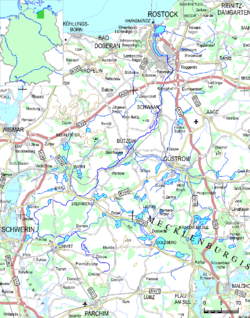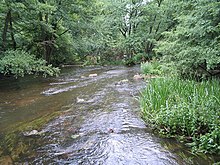Warnow
| Warnow | |
|---|---|
 | |
| Location | |
| Country | Germany |
| State | Mecklenburg-Vorpommern |
| Physical characteristics | |
| Source | |
| • location | Mecklenburg |
| Mouth | |
• location | Baltic Sea |
• coordinates | 54°10′54″N12°5′32″E/ 54.18167°N 12.09222°E |
| Length | 155.4 km (96.6 mi) |
| Basin size | 3,324 km2(1,283 sq mi) |

TheWarnow(German pronunciation:[ˈvaːno]) is a river in the state ofMecklenburg-VorpommerninGermany.It flows into theBaltic Seanear the town ofRostock,in its boroughWarnemünde.
The source of the Warnow is in Grebbin, a small village 10 kilometres (6 mi) north ofParchim,at the western end of theMecklenburg Lake District.It flows north throughSternberg,BützowandSchwaanbefore reaching Rostock.
In 2003, Germany's first modern toll road, theWarnow Tunnelwas opened, connecting the port of Rostock on the east bank with the west bank of the river.
There is inIndaial,a city of Brazil, a river with the same name. WhenHermann Blumenaucame to America and started to explore the country, he gave this name to the river in the Brazilian city because it resembled the river in Germany.
Names and etymology
[edit]The origins of the name are uncertain. Recent work suggests a non-Indo-European (perhaps specificallyHattic) elementar(i)n('spring, stream'), giving rise to the Slavic formWarnowthrough the prosthesis of /v-/.[1]TheWarnabi,a medieval Slavic tribe, probably derived their name from the Warnow. The ancient geographerClaudius Ptolemäusmentioned a river around 150 CE whose location would correspond to the Warnow, which he called the Χαλοῦσος (Latin: Chalusus).[2]The river also appears in a few medieval sources under names along the lines ofGoderak:Guðakrsá('God-field's river') inKnýtlinga sagachapter 119 andSaxo Grammaticus'sGesta Danorumin the phrasead Gudacram amnem('to the river Gudacra'; xiv.25.16).[3]Meanwhile,Arnold of Lübeck'sChronica Slavorummentions thatBerno, Apostle of the Obotrites'pro Gutdracco Godehardum episcopum venerari constituit' ('instituted the veneration ofBishop Godehardin place of Gutdracco').[4]This Gutdracco is otherwise unknown, and there is some suspicion that the name of this god arose as a folk-etymologisation of the name of the river.[5]
References
[edit]- ^Hanswilhelm Haefs,Ortsnamen und Ortsgeschichten auf Rügen mitsamt Hiddensee und Mönchgut: Anmerkungen zur Geschichte(Books on Demand, 2003), p. 14.
- ^Claudius Ptolemaios:Geographike Hyphegesis,Ch. 11:Germania Magna.
- ^Saxo Grammaticus,Gesta Danorum: The History of the Danes,ed. by Karsten Friis-Jensen, trans. by Peter Fisher, 2 vols (Oxford: Clarendon Press, 2015), II 1168 n. 155.
- ^Nikolaĭ Mikhaĭlov,Mitologia slava: studi sulla mitologia dei popoli slavi. Antologia,Studi Slavi, 1 (Pisa: Universita degli studi di Pisa, Istituto di lingua e letteratura russa, 1995), p. 54.
- ^Hanswilhelm Haefs,Ortsnamen und Ortsgeschichten auf Rügen mitsamt Hiddensee und Mönchgut: Anmerkungen zur Geschichte(Books on Demand, 2003), p. 14.
